Here is the first session of our new series discussing some of Robert Jenson’s work on the Last Things, beginning with his chapter, “The Saints.”
Next Monday, we will discuss the content under sections II and III.
You can join us live this evening at 7:00 EST HERE.
And by way of introduction, here’s the recording of the Mockingbird Book Club discussion I did on Robert Jenson:
Show Notes
Summary
The conversation explores the themes of liturgical significance, the eschatology of individuals versus community, the impact of injustice, and the nature of hope and forgiveness in the context of faith. The participants reflect on personal experiences and theological insights, particularly focusing on the communal aspect of God's promises and the importance of recognizing the interconnectedness of all believers, both living and deceased.
Takeaways
The liturgical calendar marks significant events in the Christian faith.
Injustice in the death penalty system raises moral questions.
Eschatology should focus on community rather than just individuals.
Israel's history is crucial to understanding God's promises.
Hope in resurrection is a communal promise, not just individual.
Forgiveness is a powerful theme in the Christian narrative.
The saints represent God's faithfulness to His promises.
God's love is inclusive and extends to all individuals.
The church's role is to embody and proclaim hope.
Personal stories illustrate the complexities of faith and justice.
Sound Bites
"It's not about where do you go when you die."
"Even your unforgiveness is forgiven."
"God refuses to be God without us."























Share this post